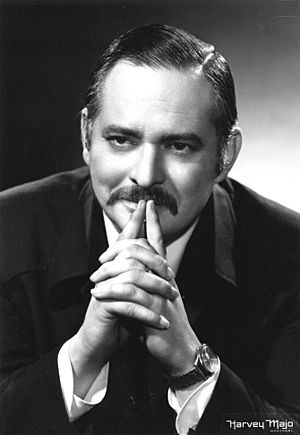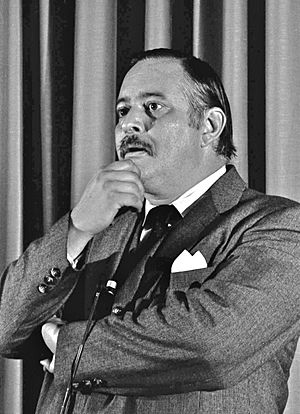Jacques Parizeau facts for kids
Quick facts for kids
Jacques Parizeau
|
|||||||||||||||||||
|---|---|---|---|---|---|---|---|---|---|---|---|---|---|---|---|---|---|---|---|

Parizeau in 1976
|
|||||||||||||||||||
| 26th Premier of Quebec | |||||||||||||||||||
| In office September 26, 1994 – January 29, 1996 |
|||||||||||||||||||
| Monarch | Elizabeth II | ||||||||||||||||||
| Lieutenant Governor | Martial Asselin | ||||||||||||||||||
| Deputy | Bernard Landry | ||||||||||||||||||
| Preceded by | Daniel Johnson Jr. | ||||||||||||||||||
| Succeeded by | Lucien Bouchard | ||||||||||||||||||
| Leader of the Opposition of Quebec | |||||||||||||||||||
| In office September 25, 1989 – September 26, 1994 |
|||||||||||||||||||
| Premier | Robert Bourassa Daniel Johnson Jr. |
||||||||||||||||||
| Preceded by | Guy Chevrette | ||||||||||||||||||
| Succeeded by | Daniel Johnson Jr. | ||||||||||||||||||
| President of the Parti Québécois | |||||||||||||||||||
| In office March 18, 1988 – January 27, 1996 |
|||||||||||||||||||
| First Vice-President |
|
||||||||||||||||||
| Preceded by | Guy Chevrette (interim) | ||||||||||||||||||
| Succeeded by | Lucien Bouchard | ||||||||||||||||||
| Minister of Finance | |||||||||||||||||||
| In office November 26, 1976 – November 27, 1984 |
|||||||||||||||||||
| Premier | René Lévesque | ||||||||||||||||||
| Preceded by | Raymond Garneau | ||||||||||||||||||
| Succeeded by | Yves Duhaime | ||||||||||||||||||
|
|||||||||||||||||||
| Personal details | |||||||||||||||||||
| Born | August 9, 1930 Montreal, Quebec, Canada |
||||||||||||||||||
| Died | June 1, 2015 (aged 84) Montreal, Quebec, Canada |
||||||||||||||||||
| Political party | Parti Québécois | ||||||||||||||||||
| Spouses |
|
||||||||||||||||||
| Alma mater |
|
||||||||||||||||||
| Profession | Economist | ||||||||||||||||||
Jacques Parizeau (born August 9, 1930 – died June 1, 2015) was an important Canadian politician and economist. He was known for supporting Quebec's independence. He served as the 26th premier of Quebec from September 1994 to January 1996.
Contents
Early Life and Education
Parizeau was born in Montreal, Quebec. His family was well-known and had a lot of wealth. His father, Gérard Parizeau, built a large financial company in Quebec. Jacques' family had a history of important people, including a great-grandfather who helped start the Montreal Chambre de Commerce.
As a teenager, Parizeau had strong ideas. He even handed out flyers for Communist politician Fred Rose. He never officially joined the Communist party, but he was interested in their ideas.
His parents wanted him to be bilingual, so they sent him to English summer camps. He went to a private Catholic school called Collège Stanislas. Later, he earned a PhD from the London School of Economics in England. He also studied at HEC Montréal, Paris Institute of Political Studies, and Faculté de droit de Paris.
Parizeau was known for his formal style, including wearing three-piece suits. He spoke both French and English very well, which earned him the nickname "Monsieur."
Political Career and Achievements
Parizeau believed that the government should play a role in the economy. In the 1960s, he was a key advisor to the Quebec government during the Quiet Revolution. This was a time of rapid change in Quebec.
He helped with important projects like the nationalization of Hydro-Québec in 1962-1963. This meant the government took control of the hydro-electric company. He also worked to create the Quebec Pension Plan in 1963-1966.
Joining the Parti Québécois
Over time, Parizeau became a strong supporter of Quebec becoming an independent country. He officially joined the Parti Québécois (PQ) on September 19, 1969. From 1970 to 1973, he was the president of the PQ’s executive council.
In the 1976 provincial election, the PQ won, and Parizeau was elected to represent the district of L'Assomption. The new premier, René Lévesque, made him the Minister of Finance.

As Minister of Finance, Parizeau introduced new economic ideas. These included the Quebec Stock Savings Plan and the Fonds de solidarité (Solidarity Fund) FTQ in 1983. The Solidarity Fund helps invest in Quebec businesses and create jobs.
Parizeau was married to Polish immigrant Alice Poznanska (1930–1990). He supported the Charter of the French Language. This law made French the main language in Quebec. It also limited access to English-language public schools for some children.
Premier of Quebec and the 1995 Referendum
In the 1989 election, Parizeau led the PQ, but his party did not do well. However, five years later, in the 1994 election, the PQ won a majority government. This meant they had enough seats to form the government.
Parizeau had promised to hold a referendum on Quebec's independence within a year of becoming premier. A referendum is when people vote directly on an important issue. He kept his promise, even though some people disagreed.
The Referendum Campaign
At the start of the campaign, only about 40% of people supported independence. As the campaign went on, more people started to support the "Yes" side. However, this growth slowed down. Parizeau was then asked to let Lucien Bouchard take a bigger role in the campaign. Bouchard was a popular leader of the federal Bloc Québécois party and was seen as more moderate. Parizeau agreed, and Bouchard became more prominent in the campaign.
The "Yes" side lost the referendum by a very small number of votes, about 55,000. The day after the vote, Parizeau resigned as the leader of the PQ and as Quebec premier. Lucien Bouchard took over as premier on January 29, 1996.
Later Life and Legacy
After leaving politics, Parizeau retired. However, he still spoke out about politics, sometimes criticizing Bouchard's government for not pushing harder for Quebec's independence.
He owned a vineyard in France, a farm in the Eastern Townships of Quebec, and a home in Montreal. His life story was written by Pierre Duchesne.
In June 2008, Parizeau was honored as a Grand Officer of the National Order of Quebec. This is a high honor given by the Quebec government.
Death
Jacques Parizeau passed away on June 1, 2015, at the age of 84. His wife announced his death after he had been in the hospital for five months.
His state funeral was held at Saint-Germain d’Outremont Roman Catholic church in Montreal.
Images for kids
See also
 In Spanish: Jacques Parizeau para niños
In Spanish: Jacques Parizeau para niños
- Politics of Quebec
- List of Quebec premiers
- Timeline of Quebec history
 | Isaac Myers |
 | D. Hamilton Jackson |
 | A. Philip Randolph |


